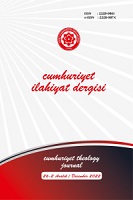Tefsirlerde Amellerin Karşılığının On Kat Verilmesi Meselesi: Tematik ve Problematik Bir İnceleme
The Issue of Giving the Reward of Deeds Tenfold in Tafsīr: A Thematic and Problematic Study
Author(s): Muhammed ErsözSubject(s): History of Islam, Qur’anic studies, Psychology of Religion
Published by: Cumhuriyet Üniversitesi İlahyat Fakültesi
Keywords: Tafsīr; Qurʾān; Reward; Sawāb; Ru’yatullah;
Summary/Abstract: It is stated in the Qurʾān that there will be punishments and rewards for the deeds done. In addition, some details about the punishments and rewards to be given are given. While talking about punishment and reward, another issue that the Qurʾān mentions is the issue of doubling of deeds. When the Qurʾān is examined, two, ten, and seven hundred numbers are encountered as the coefficients for good deeds. As the coefficient that bad deeds will be doubled, either a solid or a double expression is encountered. In this study, I will try to determine the reasons for using the expression tenfold, how it is interpreted that a good deed is rewarded tenfold, and the place of tenfold reward in the interpretation of the verses about giving the reward of a good deed. In addition to these, I will touch on the differences in interpretations of this that have emerged. The connection of the subject with the concept of ru’yatullah and the claim that it would be unfair to give an absolute tenfold reward for each good deed gives a different dimension to the differences of interpretations. In other words, there are conflicts on this subject that can be considered as richness of interpretation and diversity, as well as conflicts in which theological principles are decisive. The fact that the issue of giving tenfold reward is handled in the context of justice and the distinction between sawāb-lutf shows that the theological paradigm difference is decisive in this conflict. In this study, I will deal with the issue that good deeds will be rewarded tenfold, both in terms of nature and problematic. The problematic aspect of this issue is which part of the tenfold reward is deserved and which part is the grace of Allah, and the difference in the nature of these two. In addition, the question of whether the additional rewards that will be given to the servants can be interpreted as seeing Allah instead of tenfold reward is the problematic aspect of our study. The rewarding of deeds tenfold and the continuous increase in this coefficient not only encourages people to increase their good deeds, but also provides the opportunity to make up for the sins they have committed. Because a person who knows that he will receive at least tenfold rewards for good deeds will turn to that deed. In addition, the message is given to a person who has committed a sin and who thinks that he will not be able to get rid of his sins, no matter how much his sin is, the good deeds done afterwards will be rewarded ten times and the sins will pass. When considered together with the verse “Will anyone else be destroyed except those who commit sin?”, it can be interpreted that there is no excuse for anyone who deserves to be punished even though Allah gives tenfold rewards for a good deed, while emphasizing that the one who is punished is definitely not persecuted and deserves this punishment. As a result, while a good deed is rewarded tenfold, and evil is punished only once, Allah has done justice to those who do evil, and has shown his grace and bounty to those who do good. In many verses of the Qurʾān, it is emphasized that the reward for good deeds will be multiplied, additional rewards will be given to the deserved reward, and righteous servants will be rewarded in the best way. On the other hand, it is revealed that an evil done will be repaid with the same amount, and if a sin is caused or pioneered, that sin will be punished with the same amount. Emphasizing that there will be no persecution after these are revealed, strengthens the interpretation that Allah's grace is valid in repaying good deeds, and that justice is valid in repaying evils. In addition, by expressing that there will be no persecution even though the rates are different, it is revealed that Allah will determine the spiritual level of the good done and that there is no need for worry for the servants in this regard.
Journal: Cumhuriyet İlahiyat Dergisi
- Issue Year: 26/2022
- Issue No: 2
- Page Range: 679-698
- Page Count: 20
- Language: Turkish

